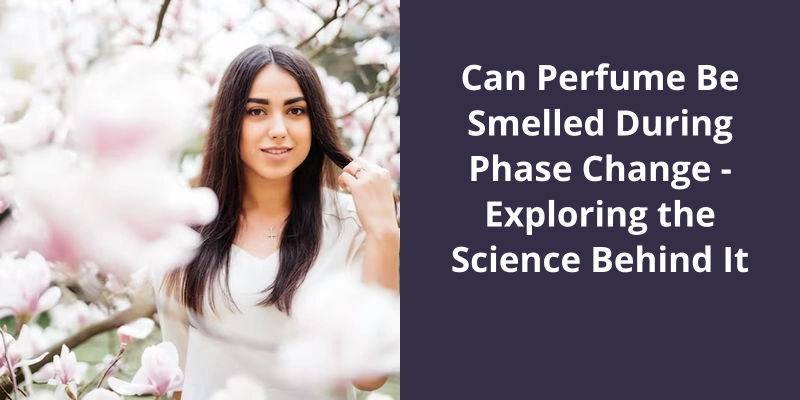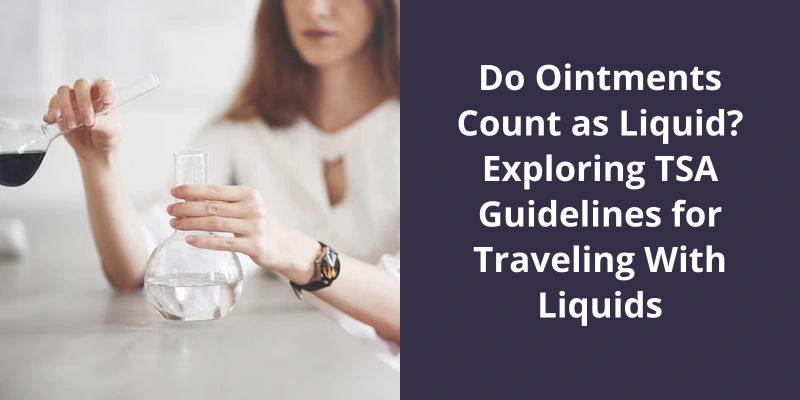Yes, perfume can be smelled during a phase change. This is because perfume is made up of volatile molecules that readily evaporate from a liquid state to a gas when exposed to air. This change from a liquid to a gas is a phase change. When this happens, the gas particles disperse into the air and some reach your nose. These particles interact with the receptors in your nose, allowing you to smell the perfume. The ability to smell a perfume during a phase change is what makes perfume a useful product, as the aim is for the scent to be detectable by others.

Is Perfume a Chemical Change?
Perfume is a popular fragrance-based product that’s designed to provide a pleasant scent to individuals. It’s typically made of a combination of essential oils, solvents, and aroma compounds. While perfume may seem like a complex mixture of chemicals, it’s still considered to be a physical change rather than a chemical one when it undergoes evaporation.
Evaporation is a common physical change that occurs when the liquid form of a substance turns into a gaseous form. This change is purely physical, as the perfumes chemical composition remains the same.
The difference between a physical and chemical change lies in the way the substances react. Physical changes don’t affect the chemical makeup of the substance but alter it’s physical state or appearance.
During the production process, various chemical reactions may occur as the essential oils, solvents, and other ingredients are combined.
This process is purely physical and doesn’t result in the formation of new molecules.
How Do Different Types of Perfume (e.g. Eau De Parfum, Eau De Toilette) Differ in Terms of Ingredients and Fragrance Concentration?
Perfumes differ in terms of their concentration, which refers to the quantity of fragrance oils present in the perfume. Fragrances with higher concentrations tend to last longer and have a stronger scent, while lower concentrations may require more reapplication. Additionally, the ingredients used in eau de parfum, eau de toilette, or other types of perfume may vary, affecting the scent profile and longevity of the fragrance.
Understanding how perfume behaves during the spraying process is crucial to getting the most out of your fragrance. From the moment the bottle is opened, the clock starts ticking on the scent’s life cycle. So, what exactly happens during the phase change from perfume’s liquid state to gaseous phase? Let’s take a closer look.
What Is the Phase Change of Perfume Spraying?
This phase change is also known as vaporization or evaporation. It’s a physical change in which the molecules of the liquid perfume overcome their intermolecular forces and break away from each other to form a gas. The process of vaporization requires energy, which is usually obtained from the surrounding environment. This is why we feel a cooling sensation when we spray perfume on our skin.
The phase change of perfume spraying has a significant effect on it’s aroma. When the perfume is in a liquid state, it’s scent may be concentrated in a small area. However, as soon as it evaporates into the air, the scent molecules disperse and mix with other molecules in the surrounding air. This is why we can smell perfume from a distance, even if the person wearing it isn’t physically close to us. The rate at which perfume evaporates depends on a variety of factors, including the chemical properties of the perfume, the temperature of the environment, and the humidity of the air.
For example, an aerosol spray may produce finer droplets that evaporate more quickly than a pump spray. Some perfumes may also be formulated specifically to achieve a certain spray pattern or velocity, which can affect how the scent is dispersed in the air.
Whether you prefer a subtle or strong scent, understanding how perfume evaporates and diffuses in the air can help you choose the right fragrance for your needs.
There are various factors that can impact the way you smell your favorite perfume. Some of these changes are due to your body, while others are related to environmental factors. So, let’s explore these factors in detail and understand why your perfume smells different from when you first bought it.
Why Does My Perfume Smell Different From When I Bought It?
Perfumes are complex chemical compositions that interact with each other and with the environment. Even small changes in the environment or your body can alter the way a perfume smells. For example, changes in pressure or elevation can affect the way a fragrance smells, as can changes in temperature or humidity. This can happen when you travel or experience a change of season.
Certain foods and drinks can change your bodys pH level, which in turn can alter the way fragrances smell on your skin.
Age is another factor that can change the way a perfume smells on your skin. As we age, our skin chemistry changes, resulting in differences in the way fragrances are perceived. This is why some people find that perfumes they used to love no longer smell the same on them.
Finally, it’s worth noting that the way we perceive fragrances is subjective. What smells amazing to one person may not have the same effect on another. Perfume preferences can also change over time as we grow and evolve, so it’s normal to experience changes in how we perceive perfumes.
Source: Perfume suddenly smelling different to me?
As we delve into the world of perfumes and fragrances, we realize that there are several factors that can influence how a scent smells on our skin. From the air around us to our own individual body chemistry, the way a perfume smells can be affected by a variety of aspects. In this article, we will explore some of the lesser-known factors that can affect the smell of perfume and how you can make sure that your scent always smells it’s best.
What Affects the Smell of Perfume?
When it comes to perfume, the scent isn’t the only thing that matters. The way it interacts with ones body chemistry and the environment can have a significant impact on how it smells. One of the most important factors that can affect the smell of perfume is the air around you. For instance, cold weather can cause perfume to smell heavier, while hot weather can cause it to evaporate quickly. Strong winds can disperse the fragrance, making it difficult for the scent to linger.
Hormone levels are another factor that can impact the way a perfume smells on someone. As our hormones fluctuate, so too can our body chemistry. This can lead to perfume smelling different on different days or at different times of the month. For example, consuming garlic or onions can cause body odor to become stronger, which can also affect how perfume smells.
When applying perfume, it’s important to consider not just how it smells, but also how it will interact with your body chemistry and the environment. To ensure the fragrance lasts as long as possible, try applying it to pulse points, such as the wrists, neck, and behind the ears. Additionally, consider experimenting with different fragrances to see which ones work best with your body chemistry and lifestyle. Finally, be aware that perfume can become overpowering if too much is applied, so start with a light spray and build up as needed. With the right approach, perfume can enhance ones personal style and help them feel more confident and attractive.
How Packaging Affects the Scent of Perfume
- Perfume bottles with wider openings may allow the scent to evaporate more quickly.
- The materials used in the packaging, such as plastic or glass, can also absorb or release fragrance molecules.
- The shape and design of the container may impact how the scent is distributed when sprayed or dabbed onto skin.
- Exposure to light and heat can also affect the stability and strength of the fragrance.
- Packaging that doesn’t properly seal can result in scent loss or contamination.
- The type of packaging used for storage and transportation can impact the scent over time.
- The size and weight of the packaging can also impact the shipping and handling costs for the product.
- Eco-friendly packaging options, such as refillable or recyclable containers, can also impact the overall sustainability of the product.
This is just one example of how personalized factors can impact the way a fragrance interacts with the wearer’s body chemistry. As such, it’s important to take these individual differences into account when selecting and wearing perfume. In the next section, we’ll explore some of the other key factors that can influence the way a fragrance smells on the skin.
Does My pH Affect My Perfume?
The pH level of an individuals skin is important to consider when choosing and wearing a perfume. The pH level of the skin can affect the way a fragrance smells, and can even cause a scent to become altered or muted. This is because different fragrances interact differently with different pH levels. For example, an acidic pH level may cause a certain fragrance to smell sour, while an alkaline pH level may cause the same fragrance to smell sweeter than intended.
Certain types of fragrances may be better suited for certain pH levels, while others may be more versatile and able to work well with a range of pH levels.
This is an important consideration when choosing and wearing fragrances, as it can affect the overall experience and enjoyment of the scent.
How to Determine Your Skin’s pH Level for Perfume Selection
One way to determine your skin’s pH level for perfume selection is to purchase pH test strips from a drugstore, and test the skin on your wrist or behind your ear. The ideal pH level for perfume application is slightly acidic, around 5.5. If your skin is too alkaline or acidic, it may not interact well with certain perfumes, leading to a shorter scent duration or a different scent altogether.
Conclusion
The ability to perceive these scents plays a significant role in our daily lives, influencing our emotions, memories, and overall well-being. Additionally, knowledge in this area can pave the way for innovations in scent technology that will continue to enrich and enhance our sensory experiences.





